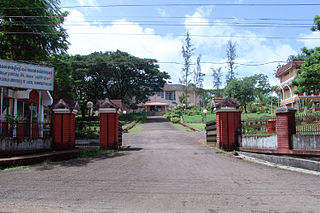
A neighbourhood or neighborhood is a geographically localised community within a larger city, town, suburb or rural area, sometimes consisting of a single street and the buildings lining it. Neighbourhoods are often social communities with considerable face-to-face interaction among members. Researchers have not agreed on an exact definition, but the following may serve as a starting point: "Neighbourhood is generally defined spatially as a specific geographic area and functionally as a set of social networks. Neighbourhoods, then, are the spatial units in which face-to-face social interactions occur—the personal settings and situations where residents seek to realise common values, socialise youth, and maintain effective social control."

In general, a rural area or a countryside is a geographic area that is located outside towns and cities. Typical rural areas have a low population density and small settlements. Agricultural areas and areas with forestry typically are described as rural. Different countries have varying definitions of rural for statistical and administrative purposes.
The United Nations defines community development as "a process where community members come together to take collective action and generate solutions to common problems." It is a broad concept, applied to the practices of civic leaders, activists, involved citizens, and professionals to improve various aspects of communities, typically aiming to build stronger and more resilient local communities.
Development studies is an interdisciplinary branch of social science. Development studies is offered as a specialized master's degree in a number of reputed universities around the world. It has grown in popularity as a subject of study since the early 1990s, and has been most widely taught and researched in developing countries and countries with a colonial history, such as the UK, where the discipline originated. Students of development studies often choose careers in international organisations such as the United Nations, World Bank, non-governmental organisations (NGOs), media and journalism houses, private sector development consultancy firms, corporate social responsibility (CSR) bodies and research centers.
The Associated Country Women of the World (ACWW) is the largest international organization for both rural and urban women, with a membership of nine million in over 70 countries. ACWW holds a triennial conference and publishes a magazine, The Countrywoman, four times a year.

The Technical Centre for Agricultural and Rural Cooperation ACP-EU (CTA) was established in 1983 under the Lomé Convention between the African, Caribbean and Pacific Group of States and EU member states. Since 2000 CTA has operated within the framework of the ACP-EU Cotonou Agreement with a mission to “strengthen policy and institutional capacity development and information and communication management capacities of ACP agricultural and rural development organisations. It assists such organisations in formulating and implementing policies and programmes to reduce poverty, promote sustainable food security, preserve the natural resource base and thus contribute to building self-reliance in ACP rural and agricultural development.”. The centre is closed in 2020, after the end of the Cotonou Agreement and the subsequent end of its financing.
Bangladesh Academy for Rural Development (BARD) Bangladesh Academy for Rural Development (BARD) started its journey on 27 May 1959 as a Training, Research and Action Research institute in rural development. The founder director of this academy dedicated to the leadership of Dr. Akhtar Hameed Khan, some researchers carried out continuous experiments with rural people and developed some model programs for rural development in this country. In the early sixties, the problems that were prevalent in rural areas were identified. The priorities of these programs are:

Dr. Hanumappa Sudarshan is an Indian social worker and tribal rights activist. He is known for his contributions to the upliftment of the forest dwelling tribes in the Chamarajanagar district of Karnataka. He is also a recipient of the Right Livelihood Award and the Padma Shri.

Dance in Cameroon is an integral part of the tradition, religion, and socialising of the country's people. Cameroon has more than 200 traditional dances, each associated with a different event or situation. Colonial authorities and Christian missionaries discouraged native dances as threats to security and pagan holdovers. However, after Cameroon's independence, the government recognised traditional dance as part of the nation's culture and made moves to preserve it.
Provision of Urban Amenities to Rural Areas (PURA) is a strategy for rural development in India. This concept was given by former president Dr. A.P.J. Abdul Kalam and discussed in his book Target 3 Billion which he co-authored with Srijan Pal Singh. The genesis of PURA can be traced to the work done by Nimbkar Agricultural Research Institute in the early 1990s on Taluka energy self-sufficiency. It was shown in the study that energy self-sufficient talukas can be a new development model for rural India in terms of creation of jobs and better amenities to its population.
Bisoro Balue is a small village in Cameroon.

Kerala Institute of Local Administration, abbreviated as KILA, is an autonomous training, research and consultancy organisation constituted under the Ministry of Local Self Government, Government of Kerala, registered as per Travancore – Cochin Literacy, Scientific and Charitable Societies Act-1955. KILA was established in 1990, in the pattern of a national institute, with the main objective of strengthening decentralization and local governance.
The Dhan Academy is an institution in India for Post Graduation in development management. Located in Madurai, it was co-founded by the Sir Ratan Tata Trust and the DHAN Foundation in December 2000. The Dhan Academy trains students to be development professionals.

The National Institute of Public Finance and Policy (NIPFP) is an autonomous research institute under India's Ministry of Finance.
Katha is a registered non-profit and non-governmental organisation based in Delhi that works in the field of community development, child welfare, education and literature. It was founded by Geeta Dharmarajan in 1988. It connects grassroots work in education, urban resurgence and story. It calls itself a "profit for all" organisation that moves towards achieving social justice and curb poverty in urban India. It also runs KITES a non-conventional school, which providing information and communication skills to 3000 children in slum area of Govindpuri, Delhi.
Computer technology for developing areas is a field focused on using technology to improve the quality of life and support economic development in regions with limited access to resources and infrastructure. This area of research seeks to address the digital divide, which refers to the gap between those who have access to technology and those who do not, and the resulting inequalities in education, healthcare, and economic opportunities.
The Congo Basin Forest Partnership (CBFP) is a non-profit initiative to promote the conservation and responsible management of the Congo Basin's tropical forests. The project aims to improve the techniques and information sharing of involved organizations. It is led by the United States and sponsored by more than 40 international governments and investors.
Development and Educational Communication Unit is an arm of Indian Space Research Organisation which aims at planning and imparting training the personnel for usage of satellite based communication systems for societal needs. The main objective of the organisation is to plan and envisage satellite usage for the general population in domains such as education and medicine, as well as many others.







